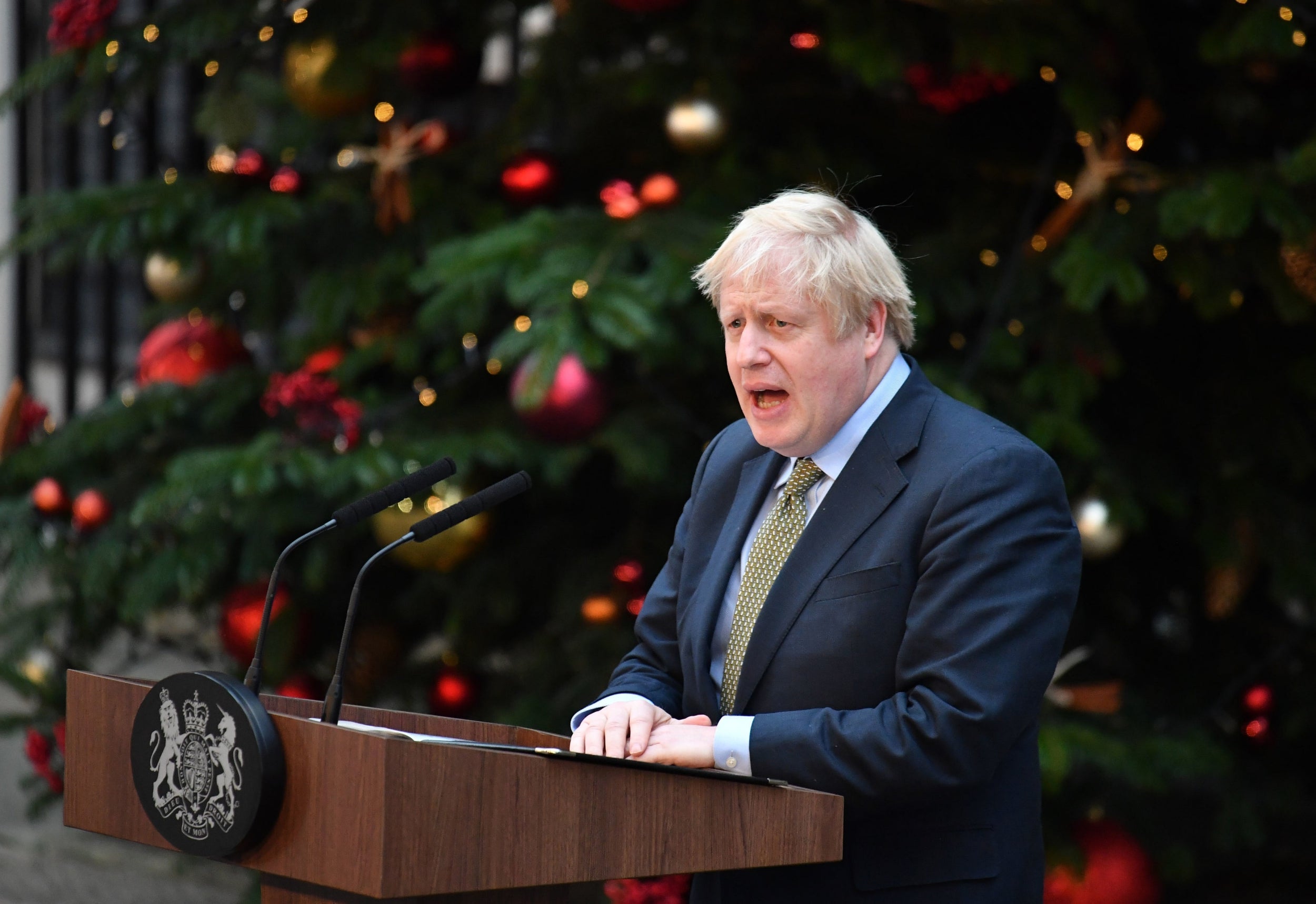‘In 10 years we have devalued our nation and made our lives poorer and harder’
The end of this decade marks the lowest point in Britain’s modern political history. Tom Peck on the Tories who have broken the country, hammered its economy and ripped its social fabric to shreds


We must invest in “the industries of the future”. A “green revolution ... clean energy ... high-speed rail”. We must usher in “a decade of shared prosperity”, and not allow “the privileged few to protect themselves”. This was what the leader of the Labour Party had to say as the decade drew to an end, but unfortunately he and the voters had other ideas. The leader in question, you have surely worked out by now, is Gordon Brown. The decade in question, the previous one. The decade of “shared prosperity” of which he spoke in his new year message 2009 has instead seen the use of food banks rise from the tens of thousands into the millions.
By New Year’s Eve 2009, according to Gordon Brown, the UK had already “seen off the worst of the recession”. But a decade of vanishingly low interest rates had not yet begun an obscene property price boom that has entrenched equally obscene inequality across the generations. And for all politicians’ lukewarm words and stone-cold efforts, the brutal truth is that the only effective remedy will be an equivalent crash that will wreck millions of lives.
The green revolution has had its moments. UK carbon emissions have fallen by about 33 per cent in the last decade. Trouble is, globally they’ve risen by 33 per cent, and it’s only the global number that counts for anything. The UK can set a good example, but it cannot lead by example. Certainly not now it has chosen, of its own free will, to become an international laughing stock.
The UK can set a good example, but it cannot lead by example. Certainly not now it has chosen, of its own free will, to become an international laughing stock
That a nation’s hopes and aspirations, as offered by its politicians, do not change from one decade to the next shouldn’t surprise anyone. As this decade draws to a close, the UK has been taken in as never before, by a liar, promising to “unleash Britain’s potential”.
Spoiler alert: the potential is never unleashed. It must always remain dammed up. The promise to unleash it is the closest politics has to a fundamental force. A political party can spend nine years in government, quite literally driving millions into food-bank dependency, but it can still promise, almost with a straight face, to “unleash Britain’s potential” and the voters will still believe them. Some things never change. And as such, these are not the indices on which to measure a decade of politics.
Of course, this decade will be defined by one extraordinary moment that happened right in the middle of it, and rightly so. Brexit changed everything. Its effect on Britain’s political parties is directly analogous to the First World War on the powers of Europe. Labour, Tory, Germany, Russia, Lib Dem, Austria-Hungary, the SNP: all their paths were changed utterly. Brexit has of course mutated the years that have come after it, but the light from its mushroom cloud also illuminates what came before.
It took the Conservative Party just one single year of majority government to break their country beyond repair. To hammer its economy and rip its social fabric to shreds
The years 2010 to 2016 seem irrelevant by comparison. The Cameron era now seems almost like the Clinton era: historically pointless years, sandwiched in the case of the former, between the fall of the Berlin Wall and 9/11, and in the latter, the financial crash and the EU referendum. It is now a well-established, and certainly true narrative that during the coalition years, the Liberal Democrats kept the Conservative Party’s baser instincts intact, then carried the electoral can for it. It would be easy to see even without Brexit, but Brexit sets it in blinding light. It took the Conservative Party just one single year of majority government to break their country beyond repair. To hammer its economy and rip its social fabric to shreds.
Whatever one’s view of Brexit, it seems that the government, and the prime minister, that delivered it, didn’t want it. For that reason, it stands alone as an act of political failure. It also reveals Cameron’s single political achievement for the chimera it always was. Cameron is a PR man, and he came along at the precise moment a PR man was exactly what the Tory party needed.

He modernised the Tory party. He changed its logo. He hugged huskies and hoodies alike. He made it electable. But it is now clear to see that it was in fact the Liberal Democrat influence, not Cameron’s influence, that masked how superficial the transformation really was.
Within a year of winning a surprising majority, the scab was ripped off with devastating force. Turns out, the Maastricht bastards had never gone anywhere. They absolutely had not “stopped banging on about Europe”. With hindsight, that Cameron imagined a national referendum could cure his party’s European disease, and not simply impact the wider nation within it, is a misjudgement of colossal stupidity. But it is so colossal, of such interstellar proportions, that it dwarfs the still giant reality that it was also mesmerically stupid in foresight.
It has been an incredible backwards jolt. The end of the political decade has borne more than a passing resemblance to the beginning of the one three before. Turns out the likes of Bill Cash, Bernard Jenkin and John Redwood were always there, just hibernating, like those North American locusts that re-hatch only once every 27 years for reasons that science has not yet managed to explain.
When historians ponder over why, in the 1930s, the UK didn’t succumb to the same extreme forces as much of the rest of Europe, the most commonly cited reason is the innate resistance of its political and electoral system to radicalisation
But, as with all revolutionary moments, they reveal change as much as they cause it. There is no doubting that Britain’s EU referendum happened at a moment of maximum exposure, throughout the world, of politics to the influence of social media, a force that we are still miles short of understanding, and properly regulating. It will happen, that’s a certainty. And whenever it does, it will have been too late. From the US to Ukraine, through to Brazil, the Philippines and dozens of other places in between, seismic electoral events have become the norm the world over.
The UK is traditionally resistant to such outcomes. Not this time. When historians ponder over why, in the 1930s, the UK didn’t succumb to the same extreme forces as much of the rest of Europe, the most commonly cited reason is the innate resistance of its political and electoral system to radicalisation. To make a dent on the House of Commons, a hell of a lot of Fascists, or a hell of a lot of communists, would all need to have gathered in the same towns. First past the post is much maligned, but it didn’t happen then, and it is highly unlikely ever to happen.
The referendum was won through the power of huge lies, constantly repeated. The 2019 general election was done in the same way. You get to have the row that you want to have, rather than the one you don’t
In the summer of 2016, the UK effectively chose to suspend its defences against populism. It made a momentous decision through a mechanism it very rarely uses, at the point at which its exposure to the dangerous influence of social media was at its very highest.
If the premiership of Gordon Brown feels like not merely a decade ago, but several lifetimes, here is the single most important reason why. It is not merely that British politics is exposed to new forces. It is that the most powerful people in the country are the most malignant. Dominic Cummings has not merely embraced the new politics. He has invented them. The referendum was won through the power of huge lies, constantly repeated. The 2019 general election was done in the precise same way.

Lie and your opponent will seek to correct you. You get to have the row that you want to have, rather than the one you don’t. In the past, it is fair to say, the British way would be to manage and curtail the opportunity for wrong-doing. We are good chaps, after all. Not anymore. Now, the public domain is being actively burnt to the ground from within 10 Downing Street. This is a time unlike any we have known before.
The end of this decade, without question, marks the lowest point in the country’s modern political history. Traditionally left-wing working-class communities have chosen self-inflicted economic pain as a price worth paying for right-wing social values, and the politics of identity. We have been taken in by a truly brazen liar. We will regret it. The case for progressive politics is always harder, and more complex to make than the case for reactionary politics. That is the burden the centre left is traditionally proud to bear. But we have reached the end of a decade in which progressive politics has repeatedly failed to find a communicator able to rise to the challenge.
To take just one example, there has been a terrifying failure to market to the white British pensioner the simple fact that it is the young immigrant that is funding their triple-locked pension and their very large NHS bill. At the end of the summer of 2019, farming communities in Cornwall and elsewhere, who voted for Brexit, were watching fruit and vegetables rot in fields because no one was coming to pick them anymore.
We have devalued our nation, made our lives poorer and harder, through no greater reason than failing to find the courage to tell ourselves the truth. This is the failure on which the Conservative Party, in the middle of the most shameless reinvention of its long history, has feasted. The only hope in the decade ahead is that it cannot last. There has to be a reckoning. Progressive politics is always – always – on the right side of history. The setbacks, however lengthy, are only temporary. But there has never been a more urgent need to make this one as brief as possible. It has already gone on far too long.
Join our commenting forum
Join thought-provoking conversations, follow other Independent readers and see their replies
Comments